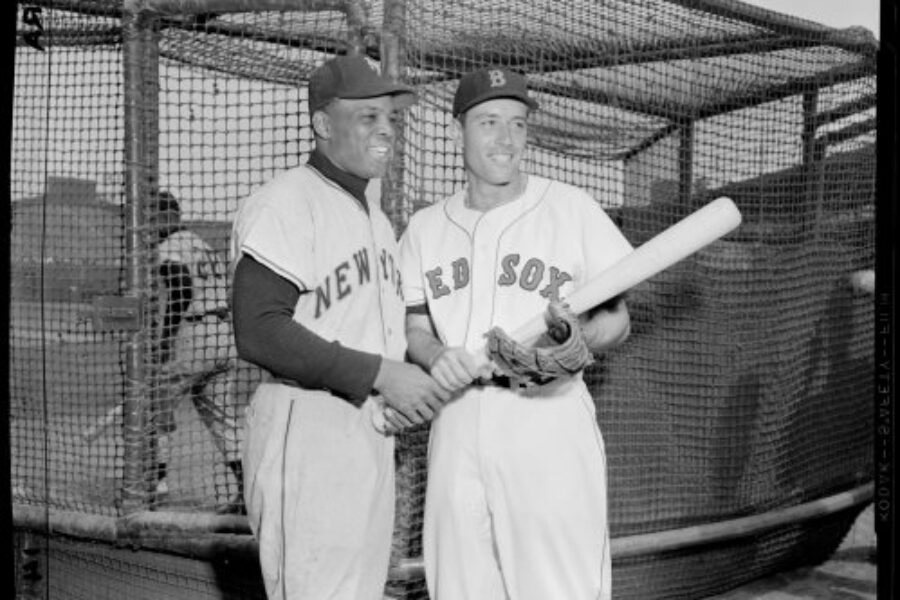By Bob Carolla
Jimmy Piersall was one of the greatest outfielders of the 1950s and 60s. He played 17 seasons, most notably with the Boston Red Sox, the Cleveland Indians, and the New York Mets. He won two Golden Glove awards and twice was selected for major league baseball’s All-Star Team. Still, he has said: “Probably the best thing that ever happened to me was going nuts. Whoever heard of Jimmy Piersall until that happened?”
His mental illness—specifically bipolar disorder—played out publicly at a time when mental illness usually was kept hidden.
Piersall was born in 1929. Growing up, he was popular, but “high-strung” and a “worrier,” who suffered severe headaches. His mother lived with depression and was hospitalized many times.
He had a temper—and an insecurity that could turn to paranoia.
In 1952, the Red Sox promoted Piersall from their farm team, the Birmingham Barons, but he learned that the team intended to play him
at shortstop.
In his memoir, Fear Strikes Out, Piersall recalls thinking: “It’s impossible. I’m not a shortstop. I’m a center fielder. [The shift] might ruin me. Wait a minute. I’ll bet that’s just what they want to do.” Fear of failure came at a time when he had been married only a few years, with two young children, and was providing full financial support for his parents.
Flashes of temper early in the season turned into a violent brawl with Yankee Billy Martin on May 24, 1952. Later in the game, he fought with one of his own teammates, and then broke down crying after he was benched.
Even after he was shifted to the outfield, Piersall’s behavior grew increasingly bizarre—which, ironically, endeared him to fans, who enjoyed the spectacle. He spread his arms like an airplane while running bases and mimicked the mannerisms of other players. In a game with the St. Louis Browns on June 11, he taunted pitcher Satchel Paige, calling out “oink, oink, oink” from first base.
“That boy is sick,” said Paige, one of the few people who recognized what was happening.
On June 20, the Red Sox sent Piersall back to Birmingham in the hope it would “straighten him out.” Instead, he was thrown out of four games and suspended.
On July 20, newspapers reported he would “take a rest” on the advice of his physician.
Two weeks later, Piersall woke up in restraints at Westborough State Hospital in Massachusetts. He had received electroshock therapy and did not remember much of the previous year.
His teammates visited him in the hospital. He received hundreds of letters from fans. He thought his career was over, but the Red Sox brought him back for the 1953 season.
In 1954, Piersall told his story on a local television show in Chicago, leading to an outpouring of support. He expanded his disclosure in a two-part story in the Saturday Evening Post, entitled “They Called Me Crazy—and I Was,” which led to the publication of Fear Strikes Out in 1955.
Two years later, the book was made into a movie with the same title, starring Anthony Perkins and Karl Malden.
“Mental illness is no different from any kind of illness,” observed Piersall’s doctor in the film. The magazine series, book, and movie delivered a powerful anti-stigma message on a national scale.
Piersall adopted an attitude of laughing at his illness. He cultivated a persona based on “zany antics.”
In 1959, Piersall was traded to the Cleveland Indians. Once, he pulled out a water pistol and squirted an umpire. Another time, his teammates had to rescue him after he challenged Yankee fans to a fight. He didn’t hesitate to confront hecklers who made mean-spirited slurs about mental illness.
In 1963, Piersall hit his 100th home run while playing for the New York Mets. He celebrated by running the bases facing backwards. Soon after, Mets manager Casey Stengel, a colorful personality in his own right, announced he was letting Piersall go because “there was room for only one clown on the team.”
Piersall finished his playing career in 1967 with the Los Angeles Angels. He became outfield instructor for the Texas Rangers and a broadcaster for the Chicago White Sox.
After being fired for feuding with the White Sox management, he wrote a second memoir The Truth Hurts (1985)—in which he provided additional detail about his illness.
Some might argue that Piersall perpetuated stigma through outrageous behavior and embrace of language like “crazy.” But that is perhaps too easy to say in 2008. Fifty years ago, going public with mental illness was like breaking the sound barrier. The sonic boom has echoed through the years.
In 2009, Piersall will turn 80. He hasn’t made baseball’s Hall of Fame, but his name is included on NAMI’s “Famous People” poster, which honors individuals whose mental illnesses have enriched our lives.
This article is based on Piersall’s autobiography, Fear Strikes Out, and reporting by Dom Amore; “Quite The Character,” Hartford Courant (APSE Writing Competition 1999); Bob Dolgan, “One of a Kind,” Baseball Digest (December 1, 2001); Mike Puma, “A Hall of Fame Personality,” ESPN.com (May 24, 2004); and Jeff Merron, “Mystery Man,” 108 Magazine (Summer 2007). Thanks also to the Boston Red Sox.
Source: https://nami.org/Blogs/NAMI-Blog/August-2008/When-Stigma-Struck-Out-The-Jimmy-Piersall-Story




